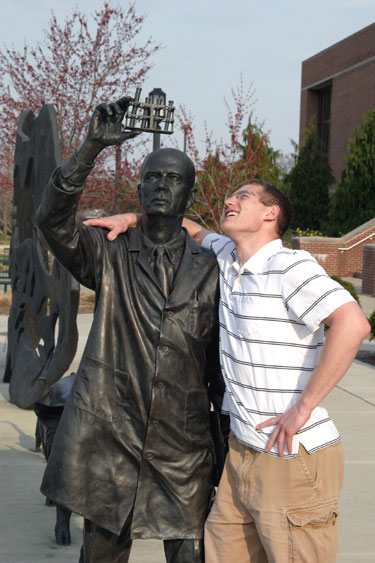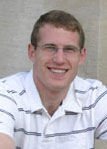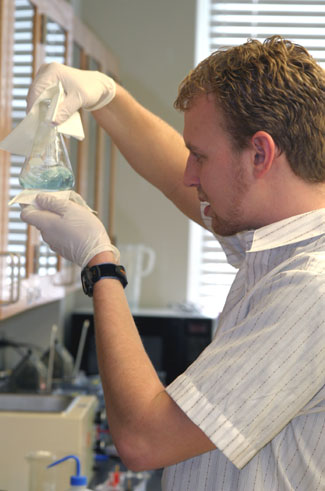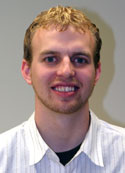 Don’t underestimate the biology and chemistry education, but it’s the intangibles that make the difference for Wabash pre-med students. Todd Vogel ’04, in his first year of medical school, and Tony GiaQuinta ’05, who gained early acceptance to I.U., believe the little things make a big difference at Wabash College.
Don’t underestimate the biology and chemistry education, but it’s the intangibles that make the difference for Wabash pre-med students. Todd Vogel ’04, in his first year of medical school, and Tony GiaQuinta ’05, who gained early acceptance to I.U., believe the little things make a big difference at Wabash College.
"Wabash trains you to be a great doctor," GiaQuinta said. "It does not focus your education just to do well on the (medical school acceptance) test. I don’t think the institution you go to really affects how you’re going to do on the test.
"Wabash understands that if you’re a doctor you’re not analyzing patients just on enzymes and biochemical reactions. They know that being a doctor is based on patient relationships and it requires a certain amount of humanity that Wabash really prepares you for. I think that’s the heart of being a doctor, to see a patient not as a biological entity but as a human being who is hurting and needs your help to heal them."
Vogel, in his first year of medical school at the West Lafayette campus of the Indiana University School of Medicine, used similar words to describe his Wabash experience.
"Wabash isn’t necessarily the best prep school you can go to, what it gives you is more of the intangibles," said Vogel, who won more than a dozen awards as a photojournalist for Wabash's newspaper, The Bachelor , and yearbook, The Wabash. "Wabash makes you really more accepting of different people, different cultures; it’s one of the things I really appreciate about Wabash.
"There is a confidence issue more than anything. You’re presented problems in upper level science classes and humanities classes that are not so much related to medicine but challenges you to think through a problem. Can you think through the steps? If you can do that you can apply for medical school or anything else. Wabash did an excellent job of doing that for me."
Though both cite the intangibles, the two men agreed the Wabash traditions are what lured them to the Crawfordsville campus.
 "It was a liberal arts education which left me with lots of options," said Vogel, a cum laude graduate from the Evansville area. "It was very welcoming. I wanted someone to talk to me on a daily basis not because they were obligated to do so because of their job but because they’re interested in knowing who I am."
"It was a liberal arts education which left me with lots of options," said Vogel, a cum laude graduate from the Evansville area. "It was very welcoming. I wanted someone to talk to me on a daily basis not because they were obligated to do so because of their job but because they’re interested in knowing who I am."
Vogel looked at many schools before deciding on Wabash. At times in his Mount Vernon Senior High School career he considered photojournalism.
"They are completely separate things," he said. "But do certain things carry over? Yes. There are certain aspects of science that I see now that help me understand how my camera works. And my photography carries over in my observation skills that I can take into medicine."
 For GiaQuinta it wasn’t a camera but a violin. He’s been a member of the college orchestra while staying busy in his fraternity and APO.
For GiaQuinta it wasn’t a camera but a violin. He’s been a member of the college orchestra while staying busy in his fraternity and APO.
"Wabash gave me a great opportunity to keep playing," the Fort Wayne Canterbury High School graduate said. "That wouldn’t have happened if I had gone to I.U. Participation is important at Wabash and here you don’t have to be a top-notch player to keep doing something like that."
GiaQuinta might not have a stellar future with his violin, but his pre-med credentials impressed I.U. He gained early acceptance in January.
"To be honest I took the test in the fall and technically that should have put me behind because most people take it in the spring," he explained. "I think what I’ve done at Wabash and what Wabash has done for me by giving me a really supreme education … I just think that together made my application that much stronger and that much more competitive than others."
GiaQuinta's early admission is no fluke for Wabash. The College boasts an 81 percent admissions rate to med school for its undergraduates.
But both men returned to those intangibles as Wabash’s greatest asset.
"I’d recommend a liberal arts education to anyone," Vogel said. "Unless someone is very gifted in one area, the music or the arts where you can go somewhere very high-end with a full scholarship and excel at the highest level, I fully believe a liberal arts education is the way to go."
GiaQuinta said when he talks to his friends on other campuses he appreciates his Wabash education even more.
 "No where else do you get experiences like Cultures and Tradition class. I’m a biology major and chemistry minor, also a philosophy minor. I also take a wide range of classes. I can argue economics or political science. I’m a guy concentrating on the biological who is just supposed to look at empirical evidence and supposed to be very logical, but my ability to interact with other people might be a little higher caliber because of my Wabash education."
"No where else do you get experiences like Cultures and Tradition class. I’m a biology major and chemistry minor, also a philosophy minor. I also take a wide range of classes. I can argue economics or political science. I’m a guy concentrating on the biological who is just supposed to look at empirical evidence and supposed to be very logical, but my ability to interact with other people might be a little higher caliber because of my Wabash education."
GiaQuinta will be off to med school this fall while Vogel enters his second year. Vogel wants to follow in his father’s footsteps and go through medical school, but still isn’t sure he’ll practice medicine. He hasn’t ruled out more education perhaps in history or art.
Hewitt is Wabash College's Director of New Media and Web Editor
In Photos:
Upper right: Vogel has a little fun with sculpture outside of the the Purdue University building where he takes medical classes.
Middle right: GiaQuinta works on an independent study project in Hays Hall.